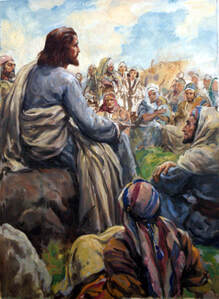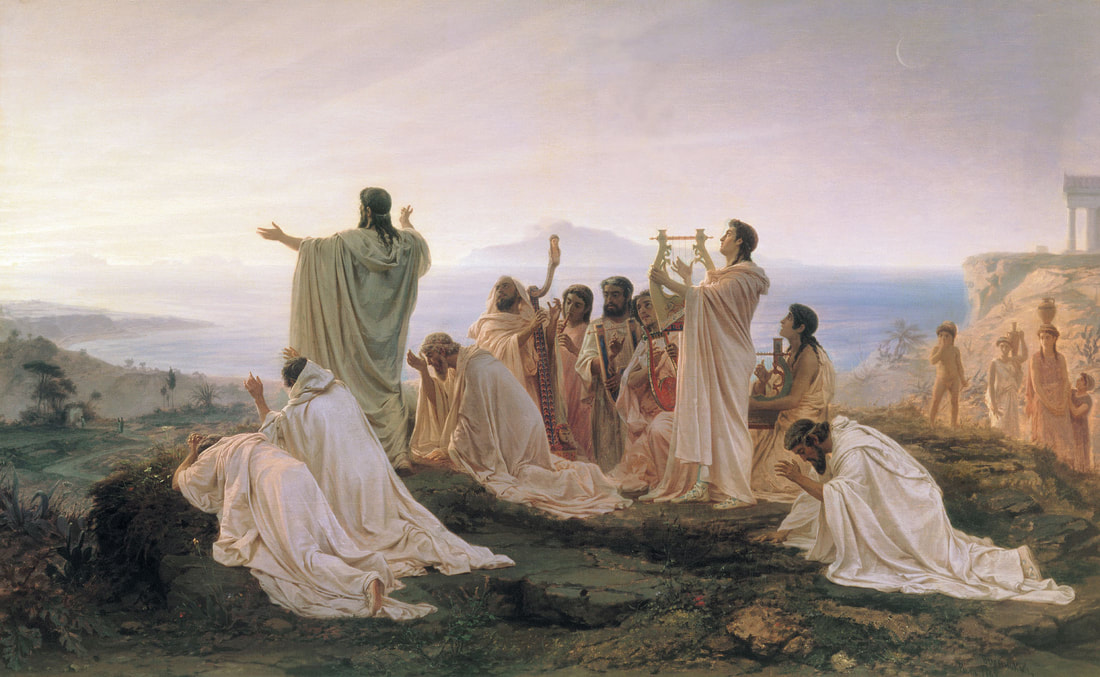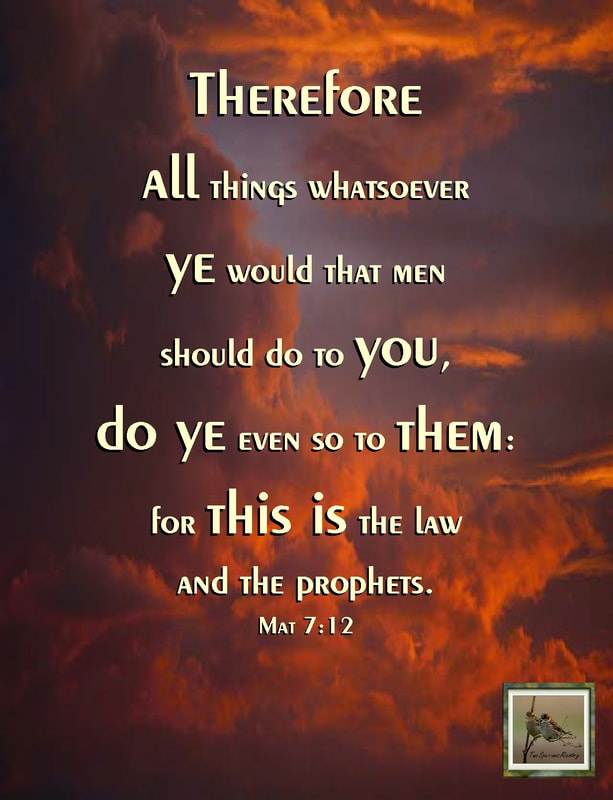
Mat 6:33 But seek ye first the kingdom of God, and his righteousness; and all these things shall be added unto you.
It is an entire teaching in capsule form; which is full of rich meaning which needs to be unpacked. This blog will go into the deeper aspects of this verse.
(1) "What is this kingdom, what advantages does it offer, and who are the people that belong to it?"
Doing good, merely for the sake of doing it, expecting nothing in return-extremely rare in this world. The trumpet-blowing may be a great success. What the Master thinks of that success is seen in the caustic irony of the words "Verily I say unto you, they have their reward." There it is - and you can see just how paltry and pitiful it is; for there is nothing a man is more ashamed of than to be caught in even the slightest attempt to parade himself. But if the praise of men is never thought of, it cannot be said "they have their reward." Their reward is to come; and though it doth not yet appear, it will certainly be worthy of our Father Who seeth in secret.
The same holds true in the realm of prayer and fasting-those seeking the kingdom of God pray, with no thought of being seen or heard of men-unless there is good cause for it. It is the motives God sees and takes note of, and notes if it is seeking His kingdom, or dead works, to be seen of men. All depends on truth in the inward parts, on the secret life of the soul with God.
Observe the almost rhythmical repetitions: "Be ye not as the hypocrites," three times repeated; "Verily I say unto you, they have their reward," the very words three times repeated; "Let thine alms be in secret" "Pray to thy Father which is in secret" "That thou appear not unto men to fast, but unto thy Father which is in secret") and once more, three times repeated, "Thy Father which seeth in secret Himself shall reward thee." No vain repetitions these. They press the great lesson home with a threefold force.
(2) "What is required of those that belong to it? what are its laws and obligations?" And if these two questions were answered satisfactorily, a third would naturally follow-
(a) Guard against seeking the good things of the world too earnestly (Mat_6:19-24). It is important to notice the strong emphasis on the word "treasure." This is evident not only from the reduplication of it - for the literal translation would be, "Treasure not for yourselves treasures upon the earth" - but also from the reason against it assigned in Mat_6:21 : "Where thy treasure is, there will thy heart be also." It is clear, then, that there is no prohibition of wealth, but only of making it "thy treasure." But against this the law of the kingdom is in the highest degree decided and uncompromising. The language is exceedingly forcible, and the reasons marshaled are terribly strong. With all faithfulness, and with growing earnestness, the Master shows that to disobey this law is foolish, pernicious, fatal. It is foolish for all earthly treasures are perishable, eaten by moth, consumed by rust, stolen by thieves, while the heavenly treasures of the spiritually-minded are incorruptible and safe for evermore. It is not only foolish, but most pernicious, - injurious to that which is most sensitive and most precious in the life, that which is to the soul what the eye is to the body, the darkening of which means the darkening of the whole body, not the mere clouding of the vision, but the condition suggested by the awful words "full of darkness"; while the corresponding deterioration in the lower ranges of the life is indicated by what follows: "If therefore the light that is in thee be darkness, how great is that darkness!" It is not only foolish and most pernicious, but fatal, for "No man can serve two masters "; so that to set the heart on the world means to give up the kingdom. It is vain to try to satisfy two claimants of the heart. One or other must be chosen: "Ye cannot serve God and mammon."
(b) Against anxiety about the things of the world.
Although this evil seems to lie in the opposite direction from that of avarice, it is really the same both in its root and its fruit, for it is due to the estrangement of the heart from our Father in heaven, and amounts, in so far as it prevails, to enslavement to the world. The covetous man is enslaved in one way, the anxious man in another; for does not our common language betray it every time we think or speak of "freedom from care"? We need not wonder, then, that our Lord should connect what He is about to say on this evil so closely with what He has said on the other, as He does by use of the word therefore: "Therefore I say unto you, Be not anxious for your life."
But though, like the other, it is slavery, the sin of it is not nearly so great, and hence the difference of tone, which cannot but be observed as this new caution is given. It is no longer strong condemnation, but gentle expostulation; not dark threatening now, but tender pleading. As before, reason after reason is given against yielding to the all too natural weakness of the human heart. We are encouraged to remember what God has given already: the life, with such amazing powers and capabilities; the body, with all its marvelous intricacy and adaptation: and can it be supposed that He is likely to withhold the food to maintain the life, the raiment to clothe the body? - to remember how the little birds of the air and the modest lilies of the field are not forgotten: how then can we think that our Father would forget us, who are of so much more value than they? - to remember that the very fact that we know Him as our Father should be guarantee enough, preventing us from an anxious solicitude pardonable in the heathen, who have no such knowledge of a Father in heaven Who knoweth what His children need; - to remember also how vain and fruitless is our care, seeing we cannot in the very smallest lengthen the life for which we fret, while our times are wholly in the hand of Him Who gave it at first and daily satisfies its wants. Such is a bare outline of the thought in this passage, to attempt to expound or illustrate which would be to spoil it. The best way to deal with such a passage is first to study it carefully to see that its meaning and the point of all its parts is clearly apprehended, and then quietly, slowly, lovingly to read it over and let its heavenly music enter into the soul. Then, when the reading is finished and the great lesson has filled the heart with trustful love, we may look back upon it and observe that not only is a great spiritual lesson taught, but incidentally we are encouraged and directed to interrogate nature and learn what she has to teach, to gaze on her beauty and lovingly look at what she has to show. Thus we find, as it were by the way, in the simple words of our King, the germ principles of science and of art.
But these are wayside pearls; no special attention is called to them. These glimpses of nature come so naturally from the Lord of nature that nothing is made of them - they "flash along the chords and go"; and we return to the great lesson which, now that the cautions have been given, can be put in its positive form: "Seek ye first the kingdom of God, and His righteousness; and all these things shall be added unto you" (Mat_6:33.) Seek ye first His kingdom, and His righteousness. Already, as we have seen, this lesson has been implied in the Lord’s Prayer; but it is well that it should be expressly set down - this will insure that the treasure is above, that the eye is clear, that the life is one: "and all these things shall be added," so that to-morrow need not trouble you. Trouble there must be in the world, but no one need have more than each day brings: "Sufficient unto the day is the evil thereof."
(2) As regards the evil in the world.
Here, as before, there are two warnings, each against a danger lying in opposite directions: the one, the danger of making too much of the evil we see, or think we see, in others; the other, that of making too little of it.
(a) As against making too much of it - the danger of censoriousness (Mat_7:1-5). Here, again, the language is very strong, and the warning given is solemn and earnest - a sure sign that the danger is real and great. Again, too, considerations are urged, one after another, why we should beware. First, there is so much evil in ourselves, that we should be most careful how we condemn it in others, for "with what judgment ye judge ye shall be judged; and with what measure ye mete, it shall be measured to you again." Moreover, severity is a sign not of purity but of the reverse: "Why beholdest thou the mote that is in thy brother’s eye, but considerest not the beam that is in thine own eye?" Our severity should be applied to ourselves, our charity to others; especially if we would have any success in the correcting of our neighbour’s faults: "How wilt thou say to thy brother, Let me cast out the mote out of thine eye; and lo, the beam is in thine own eye?" (R.V.) Otherwise we are hypocrites, and we must thoroughly reform ourselves before we have any idea even how to begin to improve others: "Thou hypocrite, first cast out the beam out of thine own eye; and then shalt thou see clearly to cast out the mote out of thy brother’s eye." Of what exceeding value is this teaching just where it stands! The Saviour has been summoning His people not only to pure morality and true godliness, but to lofty spirituality of mind and heart; and knowing what was in man - knowing that dangers lurked on his path at every turn, and that even the highest spirituality has its special danger, its besetting sin - He points it out, paints it in all its blackness, spares not the sin of the saint any more than the sin of the sinner, calls the man that gathers his skirts about him with the word or the thought "I am holier than thou" by the same ugly name with which He brands the poor fools who disfigure their faces that they may be seen of men to fast. Yet, severe as it is, is it not needed? does not our best judgment approve and applaud? and are we not glad and grateful that our Lord has warned us so earnestly and impressively against a danger it might never have occurred to us to fear?
But there is another side to the subject; so we have another warning, in relation to the evil we see in the men of the world. It is -
(b) Against making too little of it (Mat_7:6). Though we may not judge, we must discriminate. It may be wrong to condemn; but it may be necessary to withdraw, otherwise sacred things may be profaned and angry passions stirred, and thus much harm may be done though only good was intended. Such is the manifest purport of the striking caution: "Give not that which is holy unto the dogs, neither cast ye your pearls before swine, lest they trample them under their feet, and turn again and rend you."
The Saviour is now about to close what He has to say on the Righteousness cf the Kingdom in its relation to the Law and the Prophets; and He does it by setting forth in most memorable words a great privilege and a compact, comprehensive, portable rule - a privilege which will keep the heart right with God, a rule which will keep the heart right with man (Mat_7:7-12). The former is of course the more important of the two, so it comes first and has much the larger space. It is the mighty privilege of prayer. When we think of the height and the depth, the length and the breadth, of the righteousness of the kingdom - when we think of the dangers which lurk on every hand and at every stage in our life-journey - we may well cry, "Who is sufficient for these things?" To that cry of the heart this is the answer: "Ask, and it shall be given you." We have had prayer before; but it was prayer as a part of righteousness, prayer as a religious duty. Now it is prayer as a power, as the one sure and only means of avoiding the terrible evils on every side, and obtaining the unspeakable blessings, the "good things" (Mat_7:11) of the kingdom of heaven. This being so, it was of the greatest importance that we should have faith to use it. Hence the repeated assurance, and the plain strong language in which it is conveyed; hence, too, the simple, strong and touching arguments to dispel our doubts and encourage our trust (Mat_7:9-11).
Here, again, of what priceless value are these few words of our blessed Lord! Just where they are needed most they come, bringing "strength to the fainting heart" in view of the seemingly inaccessible heights of God’s holy hill, on which the city of His kingdom is set. Why need we faint or fear, now that we can ask and be sure of receiving, can seek and be sure of finding, can knock at door after door of these halls of Sion, and have them, one after another, opened at our touch?
Again as before, prayer to God is closely connected with our behaviour to men. In the model prayer we were taught to say "Forgive us our debts, as we forgive our debtors "; and not only so, but a special warning was added, that if we do not forgive others, we cannot be forgiven. So here too we are reminded that if we are to expect our Father to act in a fatherly way to us by giving us good things, we must act in a brotherly way to our neighbours. Hence the golden rule which follows, and hence its connection with the prayer-charter by the word "therefore." And now that our relations to God and man have been summed tip in the filial relation embodied in prayer, and in the fraternal relation embodied in the golden rule, all is complete, and the proof of this is furnished in the appropriate concluding words: "This is the Law and the Prophets."
(3) "How may those who desire to share its privileges and assume its obligations become citizens of it?" These, accordingly, are the three great questions dealt with in succession.
III. INVITATION TO ENTER THE KINGDOM.- (Mat_7:13-29)
The Master has now said everything necessary in order to clear away popular misapprehensions, and place the truth about His kingdom fairly before the minds of His hearers. He has explained its nature as inward and spiritual, setting forth the character of those who belong to it, the blessedness they will enjoy, and the influence they will exert on the world around them. He has set forth clearly and fully the obligations that wilt rest upon them, as summed up in the comprehensive requirement of righteousness un-understood in a larger and deeper sense than ever before-obligations of such stringency as to make it apparent that to seek the kingdom of God and His righteousness is no holiday undertaking, that it is no easy thing to be a Christian, but that it requires self-restraint, self-humbling, self-denial; and that therefore His kingdom cannot be attractive to the many, but must appeal to those who are earnest-spirited enough to ask and seek and knock for admittance.
Now that all has been fully and faithfully set forth-now that there is no danger of obtaining disciples under misapprehension-the great invitation is issued: Enter ye in. It is the free universal invitation of the Gospel, as large and liberal as that later one, "Whosoever will, let him come," though given in such a way as to keep still prominently before the minds of all comers what they may expect, and what is expected of them: "Enter ye in by the narrow gate: for wide is the gate, and broad is the way, that leadeth to destruction, and many be they that enter in thereby. For narrow is the gate, and straitened the way, that leadeth unto life, and few be they that find it".
The terms of this first invitation are very significant. The motives of fear and hope are appealed to; but not directly or specially. In the background lies, on the one hand, the dark doom of "destruction," and on the other the glorious hope of "life"; but neither the one nor the other is made emphatic. The demand for "righteousness" has been elaborated in full, and warnings against sin have been multiplied and pressed with intensest earnestness; but Christ does not now, as on account of the hardness of men’s hearts He felt it needful later on to do, set forth in language that appeals vividly to the imagination the fate of those who take the broad way of easy self-indulgence; nor does He endeavor to picture the things which eye hath not seen, nor ear heard, nor heart conceived, which God hath prepared for them that love Him; He simply suggests in the briefest manner, by the use of a single word in each case-and that word characterized not so much by strength as by suggestiveness-what will be the fate of one, the goal of the other. Suggestive as both words are in the highest degree, they are not emphatic, but lie as it were in the background, while the attention is kept on the present alternative: on the one hand the wide gate, the broad way, the many thronging it; on the other, the narrow gate, the straitened way, the few finding it. Our Lord summons not so much to a choice that will pay, as to a choice that will cost; and in so doing makes His appeal to all that is noblest and highest and best in human nature.
Throughout the whole discourse He has been leading up to this point. He has been setting forth no prospect of happiness "to draw the carnal eye," but an ideal of blessedness to win the spiritual heart. He has been unfolding a righteousness, which, while it cannot but be repulsive to man’s natural selfishness, profoundly stirs and satisfies his conscience; and now, in strict keeping with all that has gone before, the appeal is made in such a way as shall commend it, not to the thoughtless, selfish crowd, but to those whose hearts have been drawn and whose consciences have been touched by His presentation of the blessedness they may expect and the righteousness expected of them. From all this there is surely to be learned a most important lesson, as to the manner in which the Gospel should usually be presented-not by sensational descriptions of the glories of heaven or the horrors of hell, nor by the mere reiteration of exhortations to "come to Jesus," but by such information of the mind, awakening of the heart, and stirring of the conscience as are found in perfection in this great discourse of the Master.
It is characteristic of the large view our Lord takes of human life that He speaks of only two paths. There seem so many, leading off in all different directions; and so there are on a limited view of life’s horizon; but when eternal issues are in sight, there are but two: the easy path of self-indulgence leading down to death, and the difficult path of duty leading up to life.
It is worthy of remark that there is not a trace of asceticism in our Lord’s representation. The straitness referred to is not outward, any more than the righteousness is; so that there is no encouragement given to self-imposed restrictions and limitations, as in the monastic vows of "poverty, chastity, and obedience." The way is strait enough in itself without any effort of ours to make it straiter. It is enough that we set ourselves to keep all the commandments: so shall we have a sufficiency of exercise to toughen our spiritual fibre, to strengthen our moral energies, to make us men and women instead of slaves of lust or tools of mammon. For; be it ever remembered, the way we take leads on naturally and unavoidably to its end. Destruction is no arbitrary punishment for self-indulgence; nor is life an arbitrary reward for self-discipline and surrender to the will of God. The path of self-indulgence "leadeth to destruction," by a law which cannot be annulled or set aside. But the path of self-restraint and self-surrender (for these are what make of us men, and not "blind mouths," as Milton expressively puts it), the path which is entered by the strait gate, and is continued along the narrow way, is one which in the course of natural development "leadeth unto life."
The call to enter is followed by words of solemn warning against certain dangers which might beset even those who wish to enter. First, the danger of false guidance: "Beware of false prophets." The danger lies in the future. Hitherto, while speaking throughout of present duty, there have been backward glances over the past, as our Lord has made it evident, point after point, that the righteousness of His kingdom was not the destruction, but the fulfilment of the law and the prophets. Now, however, He anticipates the time when there will be those claiming to speak in the name of God, or in His own name, whose doctrines will not be a fulfilment, but a destruction of the Truth, and a constant danger to those who may be exposed to their wolf-like ravages. There is manifestly no reference to such differences of opinion as divide real Christians from each other in these days. The doctrine throughout this manifesto is not speculative, but practical; it nowhere brings into prominence matters of opinion, or what are called theological tenets, but everywhere lays stress on that which immediately and powerfully affects the life. So it is here also, as is evident from the criterion suggested for the detection of false teachers: "By their fruits ye shall know them." Besides, the connection in which the caution occurs makes it evident that our Lord had specially in view those teachers who would lead their disciples astray as to the way of life, especially those who would dare to make that easy which he had shown to be "strait," who would set before their hearers or readers a broad path instead of the narrow one which alone leadeth unto life. This is a danger which besets us in these days. There is so strong a sentiment abroad in favour of liberality-and liberality properly so called is so admirable, and has been so much a stranger in times past-that we are in danger of accepting in its name easy-going representations of the Christian life which amount to a total abolition of the strait gate and the narrow way. Let us by all means be liberal enough to acknowledge all who have entered by the strait gate of genuine repentance, and are walking in the narrow way of faith and obedience, however much they may differ from us in matters of opinion, forms of worship, or modes of work; but let us beware how we give even the smallest encouragement to any on the broad road to imagine that they can continue as they are, and find it all right in the end. So to tamper with truth in the guise of liberality is to play the wolf in sheep’s clothing.
The test our Lord gives for "discerning the spirits" is one which requires time for its application, but it is the only sure one; and when we remember that the Master is now looking forward into the future history of His kingdom, we can see why He should lay stress on a test whose operation, though slow, was sure. It is of course assumed that the first criterion is the Word of the Lord Himself. This is - the law of the kingdom; but, knowing well what was in man. the Lord could not but foresee that there would be those who could so twist any words that might be spoken on those great subjects as to lay snares for the unwary; and therefore, besides the obvious appeal "to the law and to the testimony," He supplied a practical test which, though less speedy in its application, was perfectly sure in its results.
The announcement of so important a test leads to the development of the general principle on which its validity depends-viz., the vital connection between essential doctrine and life. In the long run the one is always the outcome of the other. In the spiritual as in the natural world every species brings forth fruit "after its kind." "Do men gather grapes of thorns, or figs of thistles? Even so every good tree bringeth forth good fruit: but a corrupt tree bringeth forth evil fruit. A good tree cannot bring forth evil fruit, neither can a corrupt tree bring forth good fruit." The law being so absolute, making it certain, on the one hand, that where there is truth in the inward parts there will be good fruit in the outward life, and on the other, that where there is corrupt fruit in the outward life there must be that which is corrupt in the hidden man of the heart, it follows that the criterion is so sure as to be without appeal: "Every tree that bringeth not forth good fruit is hewn down, and cast into the fire," (Mat_7:19) and therefore may well determine the question as to who are trustworthy teachers in the Church: "Wherefore by their fruits ye shall know them."
In the development of the principle the Master’s thought has been enlarged so as to include not teachers only, but all His disciples; and His range of view has been extended so as to embrace the last things. The great day of Judgment is before him. He sees the multitudes gathered around the throne. He foresees that there will be many on that great day who will discover, when it is too late, that they have allowed themselves to be deceived, that they have not been careful enough to test their spiritual guides, that they have not been careful enough to try themselves and make sure that their fruits were such that the Lord of the vineyard could recognize them as His own. He is filled with sympathy and sorrow at the prospect; so He lifts up His voice in earnest warning, that, if possible, none of those to whom the words will ever come may allow themselves to fall into so fatal an error: "Not every one that saith unto me, Lord, Lord, shall enter into the kingdom of heaven; but he that doeth the will of My Father which, is in heaven."
How naturally, and as it were unconsciously and inevitably, He has passed from the Teacher to the Judge! Not as a personal claim. In His earliest teaching He kept personal claims as much in the background as possible. But now it is impossible to avoid some disclosure of His divine authority. He must speak of the Judgment; and He cannot speak of it without making it appear that He is Judge. The force of this is all the greater that He is, as it were, surprised into it; for He is evidently not thinking of Himself at all, but only of those who then were or would afterwards be in danger of making a most fatal mistake, leading to consequences awful and irreparable. We can well imagine that from this point on to the end there must have been a light on His face, a fire in His eye, a solemnity in His tone, a grandeur in His very attitude, which struck the multitude with amazement, especially at the authority (Mat_7:29) with which He spoke: "Many will say to Me in that day, Lord, Lord, did we not prophesy by Thy name, and by Thy name cast out devils, and by Thy name do many mighty works? And then will I profess unto them, I never knew you: depart from me, ye that work iniquity".
Again, observe the form the warning takes, revealing the consciousness that to depart from Him was doom-one of the many tokens throughout this discourse that none else than the Lord of life and glory could possibly have spoken it. Yet how many vainly think that they can accept it without acknowledging Him!
The same solemn and regal tone is kept up throughout the impressive passage which closes all, and presses home the great warning against trusting to any experience short of the surrender of the life to do the will of God as set forth in the words of Christ His Son. The two classes He has now in view are not the two great classes who walk, the one in the broad and the other in the narrow way. They are two classes of hearers. Most of those that throng the broad way are not hearers at all; they have no desire or intention of seeking any other than the broad way-they would as little think of going up into a mountain and listening to a discourse on righteousness, as they would of wearing a hair shirt or doing any other kind of penance; but those our Lord has now in view all have the idea of seeking the right way: their very attitude as hearers shows it-they are all of the churchgoing class, to translate into modern phrase; and what He fears is that some of them may deceive themselves by imagining that because they hear with interest and attention, perhaps admiration, therefore they are in the narrow way. Accordingly He solemnly warns them that all this may amount to nothing: there may be attention, interest, admiration, full assent to all; but if the hearing is not followed by doing, all is in vain.
It may almost go without saying that, after what our Lord has just been teaching as to the vital connection between the faith of the heart and the "fruits" of the life (Mat_7:15-23), there is no "legalism" here. In fact, the doing is not outward; it is a doing of the heart. The righteousness He has been expounding has, as we have seen, been a righteousness of the heart, and the doing of it, as a matter of course, is a heart-work, having its root in faith, which is the beginning of the doing in every case, according to His own word in another place: "This is the work of God, that ye believe on Him Whom He hath sent."
The illustration with which He presses home the warning is in the highest degree appropriate and forcible. The man who not only hears, but does, makes thorough work, digs deep (as St. Luke puts it in his record), and founds the house he is building for time and eternity upon solid rock; while the man who hears but does not, is one who takes no care as to his foundation, but erects his house just where he happens to be, on loose sand or earth, which the first storm will dislodge and sweep away. Meanwhile testing times are coming-rains, floods, winds-the searching trials of life culminating in the final judgment in the life to come. These all test the work of the builder, and render apparent the wisdom of the man who provided against the coming storm by choosing the rock foundation, for his house abides through all; and the folly of the other, who without a foundation carelessly risked all, for his house gives way before the storm, and great is the fall of it.
Some who are saved just before death, may have to go through the learning process in heaven, to know how to live in the kingdom of God, I'm sure there are places of learning and teachers and angels assigned to this task.
But, it is of great benefit for those who learn to apply the teachings of Jesus while here on earth.
Those who have built their house upon the rock, and lived by the Sermon on the Mount are those who have learned to put into practice the principles of the Kingdom in this life, and will enter the kingdom of God on the other shore equipped with experiences they've learned while here. What we've learned and put into practice here, we will take with us into eternity, to be of use to the Master, and to be added upon with higher learning, as we grow in that realm of heaven. This to me, is a mind boggling truth. Selah
Lorna Couillard
(excerpts included of material from Expositor's Bible)










